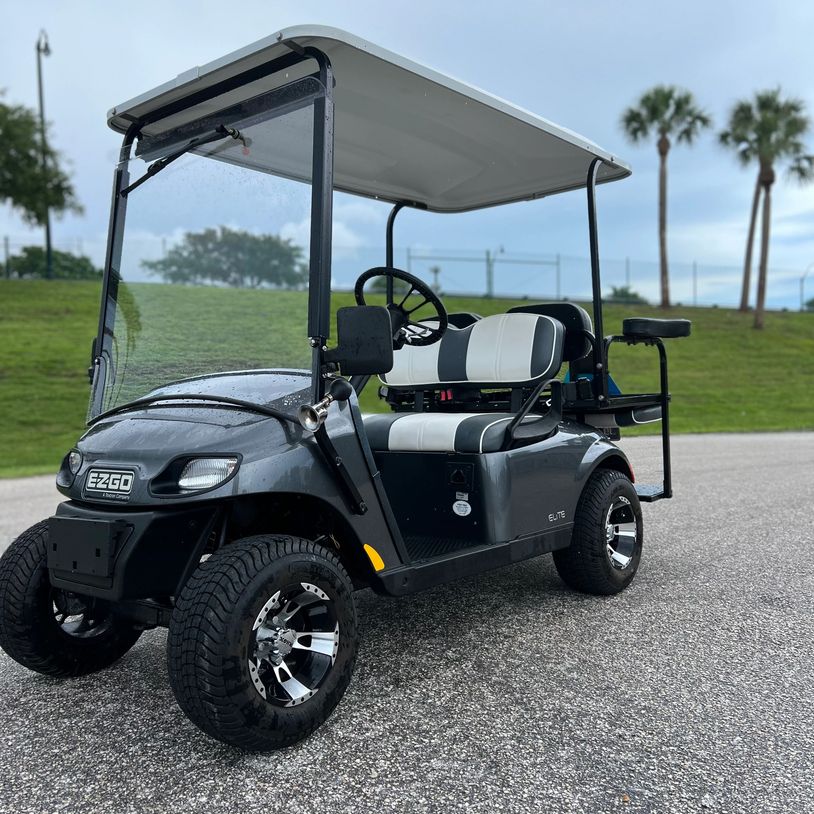FLORIDA GOLF CART STREET LEGAL LAWS
All info provided by www.flhsmv.gov

Florida’s mild climate makes outdoor activities a year-round option. Low speed vehicles (LSV), golf carts and off-highway vehicles (OHV) are a great way to enjoy local communities and natural spaces. It is important that consumers understand the differences between LSVs, golf carts and OHVs, the traffic laws applying to these vehicles, and the regulations regarding registration, titling and insurance.
Low Speed Vehicles
Section 320.01(41), Florida Statutes, defines LSVs as “any four-wheeled vehicle whose top speed is greater than 20 miles per hour, but not greater than 25 miles per hour.” LSVs must be registered, titled and insured with personal injury protection (PIP) and property damage liability (PDL) insurance. Any person operating an LSV must have a valid driver license in their immediate possession.
LSVs may be operated only on streets where the posted speed limit is 35 MPH or less and must be equipped with the following safety equipment:
- Headlamps;
- Front and rear turn signals;
- Stop lamps;
- Tail lamps;
- Reflex reflectors, red – one each side and one on the rear;
- Exterior mirror on the driver side and an interior rear-view mirror or exterior mirror on passenger side;
- Parking brake;
- Windshield;
- Seat belt for each designated seat; and a
- Vehicle identification number (VIN).
To title and register an LSV, take the following documents to a Motor Vehicle Service Center:
- Manufacturer’s Certificate of Origin;
- Form HSMV 82040 (Application for Title);
- Proof of Florida insurance (minimum $10,000 PDL and $10, 000 PIP);
- Identification – driver license, ID card or passport; and
- Applicable fees
- Title fee
- Plate fee
- Initial registration fee, if applicable
- Registration fee (varies by weight of vehicle)
Golf Carts
Golf carts are defined in section 320.01(22), Florida Statutes, as “a motor vehicle that is designed and manufactured for operation on a golf course for sporting or recreational purposes and that is not capable of exceeding speeds of 20 miles per hour.” Golf carts may be operated on roadways that are designated for golf carts with a posted speed limit of 30 mph or less. Golf carts may also cross a portion of a county road which intersects a roadway that is approved for golf carts, or that intersects a golf course or mobile home park. In both examples the roadway should have signs posted that golf carts share the roadway. The operation of golf carts on roads must comply with any more restrictive ordinances enacted by local government and should be verified prior to operating these vehicles.
Golf carts are not required to be titled or registered and, therefore, are not required to be insured with PIP and PDL insurance coverage. Golf cart operators are not required to have a driver license; however, to operate a golf cart on designated public roadways, a person must be 14 years or older.
Converted Golf Carts
Golf carts can be converted to LSVs (see LSV safety equipment requirements above). Buyers should be aware that if a golf cart has been modified to an LSV, the registration and title date do not reflect the manufacture date (age of the vehicle). Instead, it indicates the year it was registered and titled. This means that the vehicle could be older than the date listed on the title.
Titling and Registering a Converted Golf Cart
Prior to titling and registering a converted golf cart, the vehicle must be inspected and assigned a VIN at a Motorist Services Regional Office. The converted golf cart must be street-legal before applying for title and registration.
Trailer the converted golf cart to a Motorist Services Regional Office and present the following documents and fees for an inspection, VIN assignment, title and registration:
- Manufacturer’s Certificate of Origin or a bill of sale for the golf cart Form HSMV 84490 (Statement of Builder) completed by customer and Compliance Examiner/Inspector;
- Form HSMV 86064 (Affidavit for Golf Cart Modified to a Low Speed Vehicle);
- Original bill(s) of sale or receipt(s) for all parts used to convert the golf cart to a low speed vehicle;
- Certified weight slip for the converted golf cart;
- Form HSMSV 82040 (Application for Title);
- Proof of Florida insurance (minimum $10,000 PDL and $10,000 PIP);
- Sales tax or sales tax exemption information for all parts;
- Identification – driver license, ID card or passport; and
- Applicable fees
- Inspection fee
- Title fee
- Plate fee
- Initial registration fee, if applicable
- Registration fee (varies by weight of vehicle)
Guide to Owning Street Legal Low Speed Vehicles
White Rhino Golf Carts
1602 SE South Niemeyer Cir. Port St Lucie, FL 34952
Copyright © 2024 White Rhino Golf Carts - All Rights Reserved.
Designed by Kaley M.
This website uses cookies.
We use cookies to analyze website traffic and optimize your website experience. By accepting our use of cookies, your data will be aggregated with all other user data.